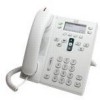Cisco 6941 Administration Guide - Page 87
Device, Phone, System > Enterprise Phone, Configuration, Device > Device Settings >, Common - ring not working
 |
UPC - 882658277801
View all Cisco 6941 manuals
Add to My Manuals
Save this manual to your list of manuals |
Page 87 highlights
Chapter Telephony Features Available for the Cisco Unified IP Phone Table 5-1 Telephony Features for the Cisco Unified IP Phone (continued) Feature Audible Message Waiting Indicator (AMWI) Auto Answer Automatic Port Synchronization Auto-pickup Block external to external transfer Busy Lamp Field (BLF) Description Configuration Reference A stutter tone from the handset, headset, or For more information, see the Cisco Unified speakerphone indicates that a user has one or more Communications Manager System Guide, new voice messages on a line. Cisco Unified IP Phone. Note The stutter tone is line-specific. You hear it only when using the line with the waiting messages. Connects incoming calls automatically after a ring or two. Auto Answer works with either the speakerphone or the headset. For more information, see the Cisco Unified Communications Manager Administration Guide, Directory Number Configuration. When the Cisco Unified CM administrator uses the Remote Port Configuration feature to set the speed and duplex function of an IP phone remotely, loss of packets can occur if one port is slower than the other. To configure the parameter in the Cisco Unified CM Administration application, choose Device > Phone, select the appropriate IP phones, and scroll to the Product Specific Configuration Layout pane. The Automatic Port Synchronization feature synchronizes the ports to the lowest speed among the two ports, which eliminates packet loss. When automatic port synchronization is enabled, it is recommended that both ports be configured for autonegotiate. If one port is enabled for autonegotiate and the other is at a fixed speed, the phone synchronizes to the fixed port speed. To configure the setting on multiple phones simultaneously, enable Automatic Port Synchronization in either the Enterprise Phone Configuration (System > Enterprise Phone Configuration) or the Common Phone Profile Configuration (Device > Device Settings > Common Phone Profile). Note If both the ports are configured for fixed speed, the Automatic Port Synchronization feature is ineffective. The Remote Port Configuration and Automatic Port Synchronization features are compatible only with IEEE 802.3AF Power of Ethernet (PoE) switches. Switches that support only Cisco Inline Power are not compatible. Enabling this feature on phones that are connected to these types of switches could result in loss of connectivity to Cisco Unified CM, if the phone is powered by PoE. Allows a user to use one-touch pickup functionality for call pickup features. For more information, see the Cisco Unified Communications Manager Features and Services Guide, Call Pickup. Prevents users from transferring an external call to another external number. For more information, see the Cisco Unified Communications Manager Features and Services Guide, External Call Transfer Restrictions. Allows a user to monitor the call state of a directory number associated with a speed-dial button on the phone. For more information, go to the Cisco Unified Communications Manager Features and Services Guide, Presence. Cisco Unified IP Phone 6921, 6941, 6945, and 6961 Administration Guide for Cisco Unified Communications Manager 8.5 (SCCP and SIP) OL-23769-01 5-3















